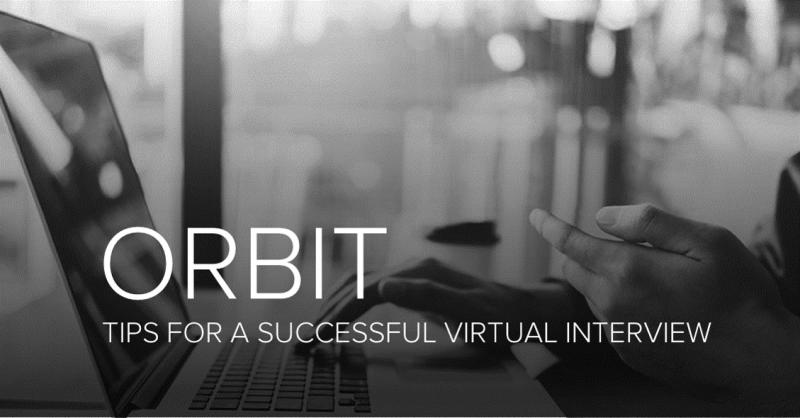
Article by: Greg Monks, Head of Orbit
Since the pandemic hit, most lawyers have been working from home. And from a job search perspective, there’s a good chance that if you’re lucky enough to get an interview, then you’ll be doing it virtually.
Interviewing for a job is never easy! All the standard advice about how to prepare for and perform during an interview still applies, but there are some other aspects I would encourage you to consider and some important tips I’d like to offer you for the next time you find yourself interviewing virtually.
Tip 1 - Check your technology
Test out the link and functionality ahead of time. Ascertain what video platform you’ll be using. Spend time familiarising yourself with how it works, especially if you’ll need to use any specific features like screen sharing. Ensure your device is fully charged and that all other devices are on silent. Check the internet connection is stable. If there will be more than two attendees consider creating a virtual waiting room so you can open the meeting once everyone is present, rather than awkwardly waiting for others to join. Confirm you know how to use the gallery view function so you can see all participants concurrently and in the same size. This allows you to pick up on their visual prompts and cues. Set yourself up in the best possible circumstances for the technology to work.
Tip 2 - Prepare your space
Find somewhere appropriately lit and quiet. Avoid sitting with your back to a window for instance. Ensure others sharing your space (pets, housemates, parents, children) are elsewhere, aware of and away from your interview.
Remember your space now also includes camera angles, so try to elevate the webcam and show yourself from the chest up, look into the webcam and hide distracting pictures or features visible in the background.
Tip 3 - Plan your attire and your image
Dress for success! Aim to wear solid colours like blue where possible. Avoid the temptation to only wear professional apparel on top because you never know when you might need to stand-up.
Your goal is to look professional. Choose a neutral background for your interview. If you have a home office and professional-looking space you can show in the background, then it can often help to personalise you. In contrast, being right up against a wall can work well enough too. It can be less risky when it comes to interruptions or accidentally displaying a messy room or last night’s empty bottles of wine!
You might even consider standing during the interview. It can actually be more dynamic. Your vocal chords tend to warm up faster so it’s easier to project your voice and you’ll probably sound even more convincing. For years I’ve been recommending to candidates telephone interviewing to stand up for their interview and use the advantage.
Tip 4 - Do your research and take notes
Research the organisation ahead of time. You might also try reviewing what the organisation is doing in response to the COVID-19 crisis. Try to get the latest information. Remember that some time might have passed between your application and your interview. So make sure you’re as conversant and up-to-date as possible. Check their website, any newsletters and social media feeds up to and including the interview day.
Tip 5 - Practise in advance
Rehearse your talking points beforehand and do a test run. Try completing a mock interview with yourself and your camera before your real interview. Monitor your body language.
If you tend to be shy, expand your range of expression (and what you’re comfortable doing) by practising what might feel like even an exaggerated performance - using hand gestures and passion.
If you’re nervous and/or talk a lot using run-on sentences with no period at the end, practise pausing and breaking your thoughts into short sentences. By making them short, you will pack more punch!
Pause as needed. Pausing at the right time can really play to your strengths. Speak clearly and take it slow. Ask and answer questions normally with a controlled tempo.
Experiment with how you might answer common questions. As you go about practising your answers to common interview questions, think about what technical legal questions you might be asked. And of course those behavioural ones!
Tip 6 - Be early and go in with a positive mindset
Log in ten minutes early to test connectivity and equipment so you can be calm and centred. During a virtual interview, you won’t get the same level of non-verbal information from the interviewer – things like eye contact, facial expressions, gestures, posture and the actual physical distance between yourselves. There’s lots of research that shows when we don’t have feedback, we tend toward a negativity bias and think “this isn’t going well.”
So experiment ahead of time by staying positive and assuming the best is happening. You might have a mantra you tell yourself when you start to doubt your performance. Or you might sit quietly for five minutes before the interview starts and mentally review all the reasons why the interview is likely to go well. Be easy on yourself!
Tip 7 - Show that you’re engaged
This is one of the biggest challenges of interviewing virtually. When listening, nod and smile. When speaking, use appropriate hand gestures. And maintain “eye contact” by looking directly into the camera rather than at the screen or at your own picture. Body language is very important in a virtual call. Be animated, emotive in your voice, use gestures, sit tall and smile.
Practise with a friend on video to get some feedback about the setting, your tone and your body language. Try exaggerating your emotions a bit on the screen. You might record yourself answering a few sample questions and watch how you appear. You’ll want to appear natural and at ease.
Tip 8 - Convey warmth
There is no doubt the pandemic has made people more eager to connect with colleagues on an emotional level. Your interviewer may have a higher expectation about how much warmth you convey during the interview. Follow the lead of the interviewer on small talk. You don’t need to go into unnecessary detail.
Tip 9 - Ask pertinent questions
Some say those who ask the best questions are the most likely to win the interview panel over and even win the job. Be curious! Always go in armed with at least two excellent questions. Time may be limited so always ask your two best questions first.
Ask open-ended questions so the interviewer can elaborate more so, then you can discover more intel and better establish your connection and common ground.
I recommend asking a question in the first person so you’re encouraging the interviewer to think about you actually being in the job. This strategy can reveal so much more about what the interviewer is thinking about you right there and then.
Ask about their onboarding process in the virtual environment and explore how the organisation is currently helping new hires with their induction process and acclimatising into roles.
Tip 10 - Close out skilfully
Even though you can’t physically shake each other’s hand, don’t be afraid to show your personality. Interviewers are equally interested in soft skills and communication. There is no better way to demonstrate this than in a virtual interview. In-house lawyers especially must strike the right balance between hard and soft skills and demonstrate ability to successfully manage and partner with different stakeholders.
Don’t forget manners go a long way. Say thank you for setting the time aside. With the shift in work hours and home responsibilities these days, it’s important to acknowledge the effort made.
In closing, some of the tips and techniques I’ve encouraged you to consider and action won’t all necessarily come naturally to you — and that’s ok. By making use of your natural ability and trying new things and new ways to interview virtually, you’re expanding your comfort zone and increasing your repertoire for what is really an online performance. This is how we can further develop in what has become an even more rapidly changing world. And it’s also how you can put your best foot forward to win the job.
If you’re interested in joining Orbit, contact Greg for a confidential conversation on how Orbit can work for you.
Greg Monks is the Head of Orbit Legal Resourcing. He has been in client-facing roles all of his career. Prior to moving into legal recruitment, Greg was a lawyer who practised for 8+ years (ex-Norton Rose Melbourne, London in-house and NSW Government). His global career in legal, human resources, talent acquisition/management and business development roles has afforded him a unique perspective, a diverse skillset and a wide network within the legal industry in various jurisdictions.
Greg Monks
Head of Orbit
t +61 3 9672 3187
m +61 477 040 800
e greg.monks@corrs.com.au
orbitlegal.com.au
